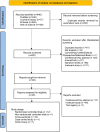The role of probiotics in adolescents' obesity
- PMID: 40673005
- PMCID: PMC12263623
- DOI: 10.3389/fcimb.2025.1546627
The role of probiotics in adolescents' obesity
Abstract
The prevalence of adolescent obesity continues to rise globally, posing significant public health challenges by affecting both physical and psychological wellness and increasing the risk of metabolic diseases in adulthood. Probiotics may influence obesity through various mechanisms, including restoring gut microbiota balance, reducing chronic inflammation, modulating lipid metabolism, aiding in weight control, and improving metabolic health. This review aims to explore the mechanisms by which probiotics act as key modulators of obesity and summarize current findings from clinical trials involving probiotics in adolescent obesity. The large-scale, multicenter, long-term follow-up randomized controlled trials are necessary to determine the optimal probiotics strains, dosages, and treatment durations, as well as to assess their long-term efficacy and safety in the future. Through such rigorous studies, probiotics have the potential to become a safe, effective, and accessible adjunct in the comprehensive management of adolescent obesity, offering a more holistic approach to health management for this population.
Keywords: adolescence; gut microbiota; lipid metabolism; obesity; probiotics.
Copyright © 2025 Chen, You and Jia.
Conflict of interest statement
The authors declare that the research was conducted in the absence of any commercial or financial relationships that could be constructed as a potential conflict of interest.
Figures
Similar articles
-
Synbiotics, prebiotics and probiotics for solid organ transplant recipients.Cochrane Database Syst Rev. 2022 Sep 20;9(9):CD014804. doi: 10.1002/14651858.CD014804.pub2. Cochrane Database Syst Rev. 2022. PMID: 36126902 Free PMC article.
-
Prebiotics, probiotics, synbiotics and postbiotics to adolescents in metabolic syndrome.Clin Nutr. 2024 Jun;43(6):1433-1446. doi: 10.1016/j.clnu.2024.04.032. Epub 2024 Apr 22. Clin Nutr. 2024. PMID: 38704983 Review.
-
Dietary interventions for recurrent abdominal pain in childhood.Cochrane Database Syst Rev. 2017 Mar 23;3(3):CD010972. doi: 10.1002/14651858.CD010972.pub2. Cochrane Database Syst Rev. 2017. PMID: 28334433 Free PMC article.
-
Synbiotics, prebiotics and probiotics for people with chronic kidney disease.Cochrane Database Syst Rev. 2023 Oct 23;10(10):CD013631. doi: 10.1002/14651858.CD013631.pub2. Cochrane Database Syst Rev. 2023. PMID: 37870148 Free PMC article.
-
Probiotics for the prevention of pediatric antibiotic-associated diarrhea.Cochrane Database Syst Rev. 2015 Dec 22;(12):CD004827. doi: 10.1002/14651858.CD004827.pub4. Cochrane Database Syst Rev. 2015. Update in: Cochrane Database Syst Rev. 2019 Apr 30;4:CD004827. doi: 10.1002/14651858.CD004827.pub5. PMID: 26695080 Updated.
References
Publication types
MeSH terms
LinkOut - more resources
Full Text Sources
Medical



